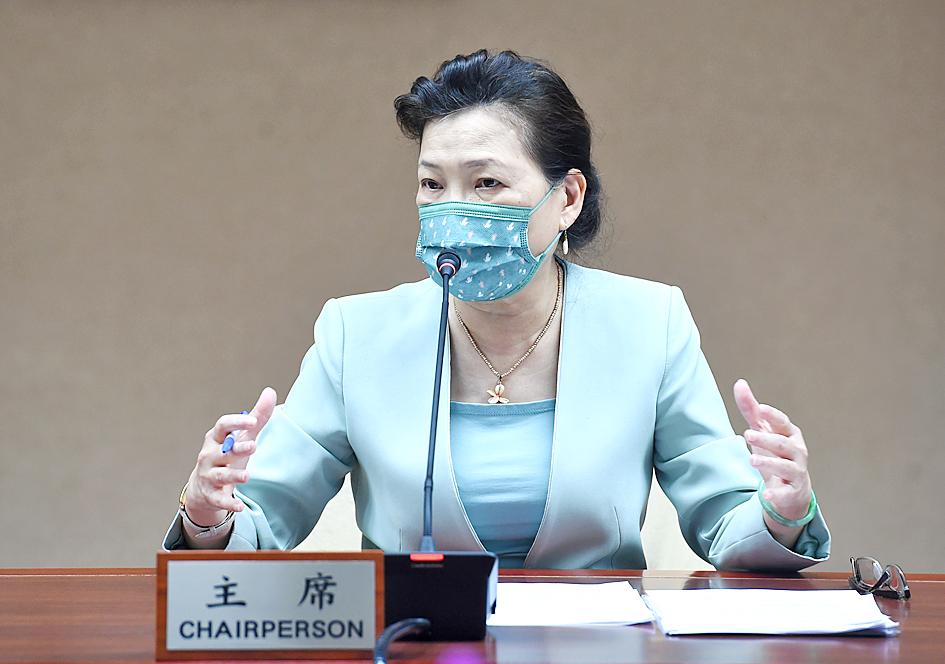Taiwan’s minimum wage “should go up,” but it would present a predicament for the government balancing a booming export sector and anemic domestic demand, Minister of Economic Affairs Wang Mei-hua (王美花) said on a Z Media (震傳媒) show hosted by Frances Huang (黃光芹) yesterday.
Coordinating measures would need to go hand-in-hand with an increase in the minimum wage to ensure businesses that are not sharing in Taiwan’s booming export-driven economy are not excessively battered, Wang said.
“With estimated GDP growth of 5.88 percent [forecast by the Directorate-General of Budget, Accounting and Statistics], it is hard not to raise the minimum wage,” Wang said. “However, due to the impact of the local COVID-19 outbreak, many domestic businesses are in rough shape.”

Photo: Liu Hsin-te, Taipei Times
“I’ve never seen such a bifurcated situation and the government must think carefully about how to act,” she said.
The nation’s minimum wage is NT$24,000 per month, or NT$160 per hour.
Labor rights advocates have long called for increases of more than 2 to 3 percent in the minimum wage, but National Central University economist Dachran Wu (吳大任) said Taiwan’s economic engine could splutter if the wage is set too high.
“First, we have a disproportionately large share of small and medium-sized enterprises here in Taiwan where the bosses are not wealthy and they are operating on the edge of profitability,” Wu said. “A higher minimum wage could push them over the edge, destroying jobs.”
Taiwan’s export-oriented economy could also be at risk as the minimum wage is the same for foreign laborers, who are often employed by Taiwan’s electronic devices manufacturers, as it is for Taiwanese.
“It is a human rights issue to have a different minimum wage for Taiwanese and non-Taiwanese, but if we raise the minimum wage too high we are making our electronic exports uncompetitive,” Wu said.
Despite those factors, Wu is advocating a higher-than-usual increase in the minimum wage of 5 percent this year.
The reason is not just the predicted GDP growth of 5.88 percent, but because inflation is expected to be 1.7 percent this year, relatively high in his view as the government usually keeps inflation under 1 percent, he said.

Zhang Yazhou was sitting in the passenger seat of her Tesla Model 3 when she said she heard her father’s panicked voice: The brakes do not work. Approaching a red light, her father swerved around two cars before plowing into a sport utility vehicle and a sedan, and crashing into a large concrete barrier. Stunned, Zhang gazed at the deflating airbag in front of her. She could never have imagined what was to come: Tesla Inc sued her for defamation for complaining publicly about the vehicles brakes — and won. A Chinese court ordered Zhang to pay more than US$23,000 in

Taiwan Semiconductor Manufacturing Co (TSMC, 台積電) yesterday held its first board of directors meeting in the US, at which it did not unveil any new US investments despite mounting tariff threats from US President Donald Trump. Trump has threatened to impose 100 percent tariffs on Taiwan-made chips, prompting market speculation that TSMC might consider boosting its chip capacity in the US or ramping up production of advanced chips such as those using a 2-nanometer technology process at its Arizona fabs ahead of schedule. Speculation also swirled that the chipmaker might consider building its own advanced packaging capacity in the US as part

Taiwan Semiconductor Manufacturing Co (TSMC, 台積電) yesterday said that its investment plan in Arizona is going according to schedule, following a local media report claiming that the company is planning to break ground on its third wafer fab in the US in June. In a statement, TSMC said it does not comment on market speculation, but that its investments in Arizona are proceeding well. TSMC is investing more than US$65 billion in Arizona to build three advanced wafer fabs. The first one has started production using the 4-nanometer (nm) process, while the second one would start mass production using the

US President Donald Trump has threatened to impose up to 100 percent tariffs on Taiwan’s semiconductor exports to the US to encourage chip manufacturers to move their production facilities to the US, but experts are questioning his strategy, warning it could harm industries on both sides. “I’m very confused and surprised that the Trump administration would try and do this,” Bob O’Donnell, chief analyst and founder of TECHnalysis Research in California, said in an interview with the Central News Agency on Wednesday. “It seems to reflect the fact that they don’t understand how the semiconductor industry really works,” O’Donnell said. Economic sanctions would